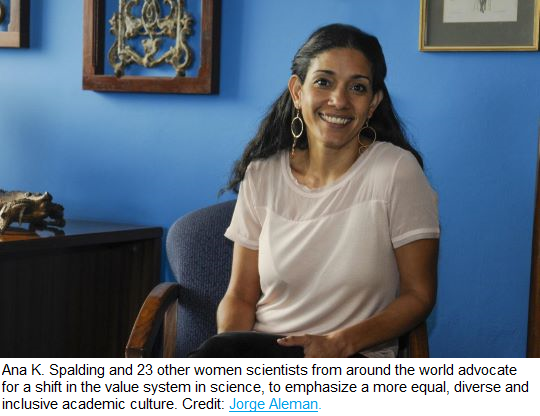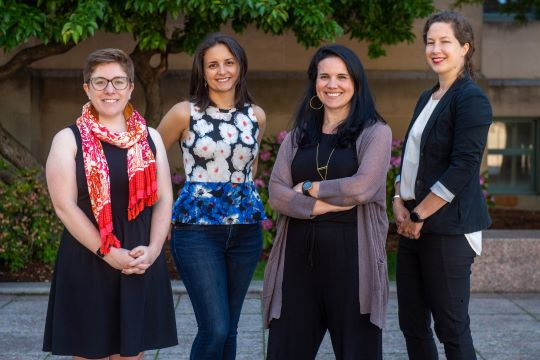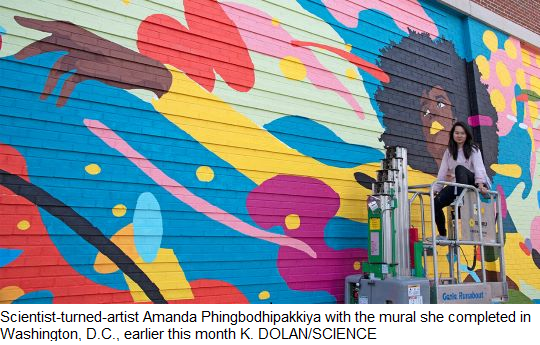Please continue to share important news and opportunities with us so that we may share it with you, and others who are committed to supporting the careers of exceptional women in science.
Using just her eyes and memory, Elisabeth Bik has single-handedly identified thousands of studies containing potentially doctored scientific images. “In June of 2013, Elisabeth Bik, a microbiologist, grew curious about the subject of plagiarism. She had read that scientific dishonesty was a growing problem, and she idly wondered if her work might have been stolen by others. One day, she pasted a sentence from one of her scientific papers into the Google Scholar search engine. She found that several of her sentences had been copied, without permission, in an obscure online book,” writes Ingfei Chen for The New Yorker. Read more.
She fell nearly 2 miles, and walked away.
At 17, biologist Juliane Diller was the sole survivor of a plane crash in the Amazon. Fifty years later she still runs Panguana, a research station founded by her parents in Peru. Under Dr. Diller’s stewardship, Panguana has increased its outreach to neighboring Indigenous communities by providing jobs, bankrolling a new schoolhouse and raising awareness about the short- and long-term effects of human activity on the rainforest’s biodiversity and climate change. Read more.
The unlikely pioneer behind mRNA vaccines.
Dr. Katalin Kariko has played a crucial role in bringing coronavirus vaccines to millions. She had to overcome years of doubt and disinterest to do so. Here’s a conversation with Dr. Kariko about her journey. Read more.
Catherine F. Sinclair, MD appointed incoming Editor-in-Chief of VideoEndocrinology™.
"The American Thyroid Association® (ATA®) is excited to announce that Catherine Sinclair, MD has been selected as the Editor-in-Chief of VideoEndocrinology, published by Mary Ann Liebert, Inc. Dr. Sinclair was selected from an extremely competitive group of candidates secondary to her evident abilities to include experience with video-based education, audiovisual production and presentation, as well as her vision for the future of VideoEndocrinology. Read more.
In conversation with the “Queen of Virology”, Professor Judy Breuer.
At the COVID-19 Genomics UK (COG-UK) Consortium’s second monthly ‘Women in COG’ event on the 17th June, they caught up with Judy Breuer, Professor of Virology at University College London. Described by Sharon Peacock as “an absolute legend in clinical virology”, Judy shared her story of how she made it to where she is today, and her personal experiences as a woman in science. Read more.
Gabby Thomas is an Olympian. Now, on to a master’s degree.
Gabby Thomas, 24, is a Harvard graduate who is working toward a master’s degree in epidemiology. She is also a first-time Olympian. Recently, she raced away from a deep and talented field to win the women’s 200 meters in 21.61 seconds, which was the third-fastest time in history. Only Florence Griffith-Joyner has ever run faster, and Thomas — who obliterated her own personal best — says she’s primed for Tokyo. She cited the importance of balance in her life. Read more.
New NASA radiation standards for astronauts seen as leveling field for women.
A blue-ribbon panel has endorsed NASA’s plans to revise its standard for exposing astronauts to radiation in a way that would allow women to spend more time in space, according to an article in Science Magazine. A report by the U.S. National Academies of Sciences, Engineering, and Medicine released on 24 June encourages NASA to proceed with its plans to adopt a new standard that limits all astronauts to 600 millisieverts of radiation over their career. Read more.
The woman who brought us the world.
A half-century ago, Virginia Tower Norwood, MIT class of 1947, invented the first multispectral scanner to image Earth from space. Landsat 1 and its successors have been scanning the planet continuously ever since. Read more.
Cancer therapy search gets boost from NIH grant.
The National Institutes of Health (NIH) awarded Lydia Kavraki, PhD, of Rice University’s Brown School of Engineering, a U01 grant to develop a new approach to model and analyze protein-ligand interactions in cancer research. Read more.
German biologist appointed head of Europe’s basic science agency.
The European Commission appointed German biologist Maria Leptin as the new president of the European Research Council (ERC), which as Europe’s largest basic science funder hands out roughly €2 billion in grants per year. Leptin will be ERC’s fifth president; her 4-year term begins on 1 October. Read more.
Why women have suffered more financially during the pandemic.
The disproportionate economic harm that the pandemic has done to women—what some are calling the “shecession”—seems to have taken many people by surprise. But longstanding inequities made women especially vulnerable, writes Rachel Hartigan. Read more.
Marianna Limas, Social Media Manager
Nilda Rivera, Partnership and Events Manager



